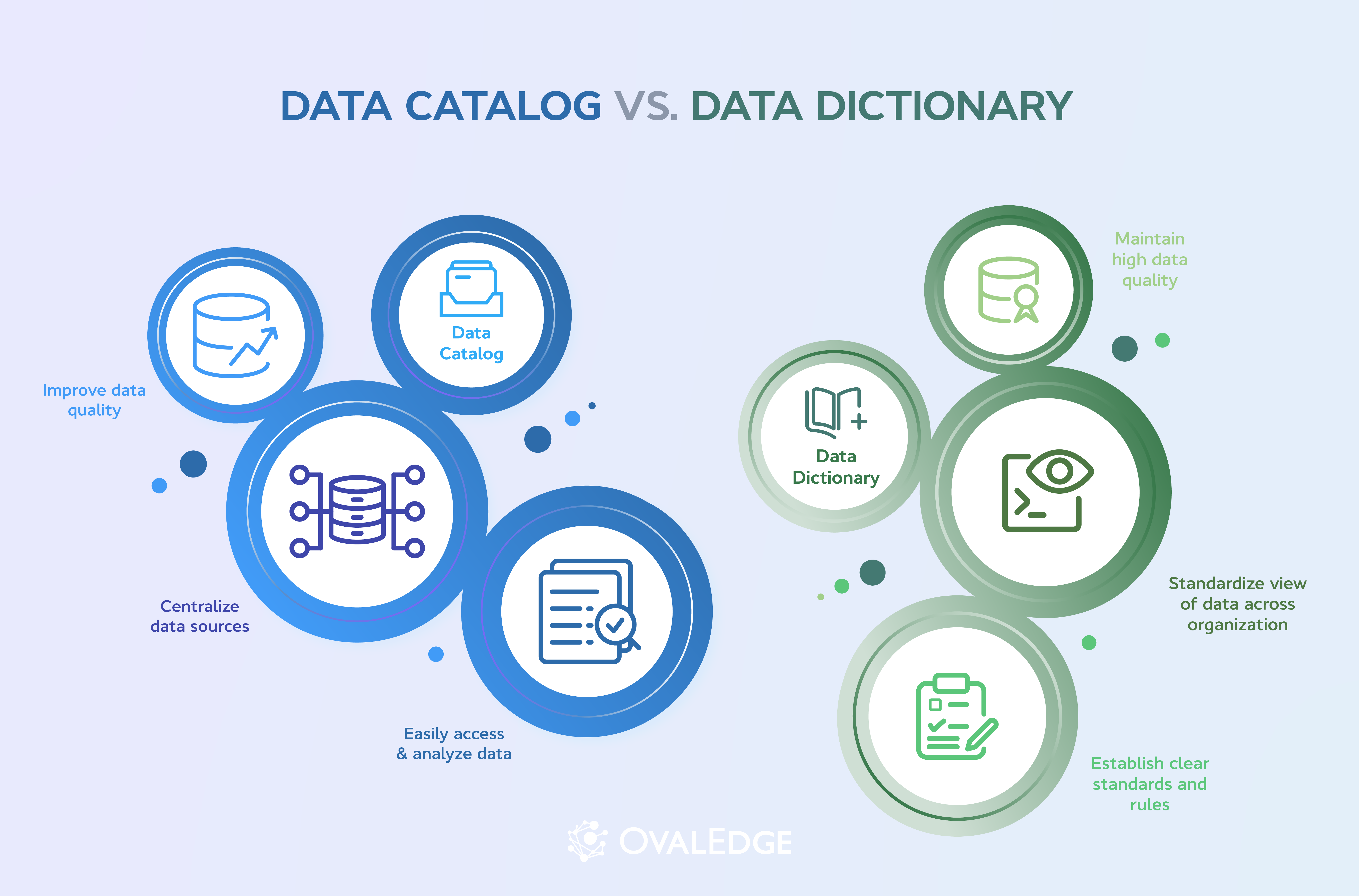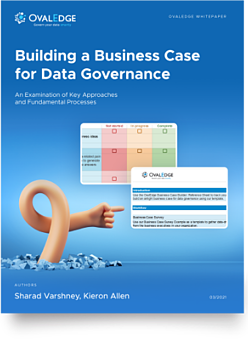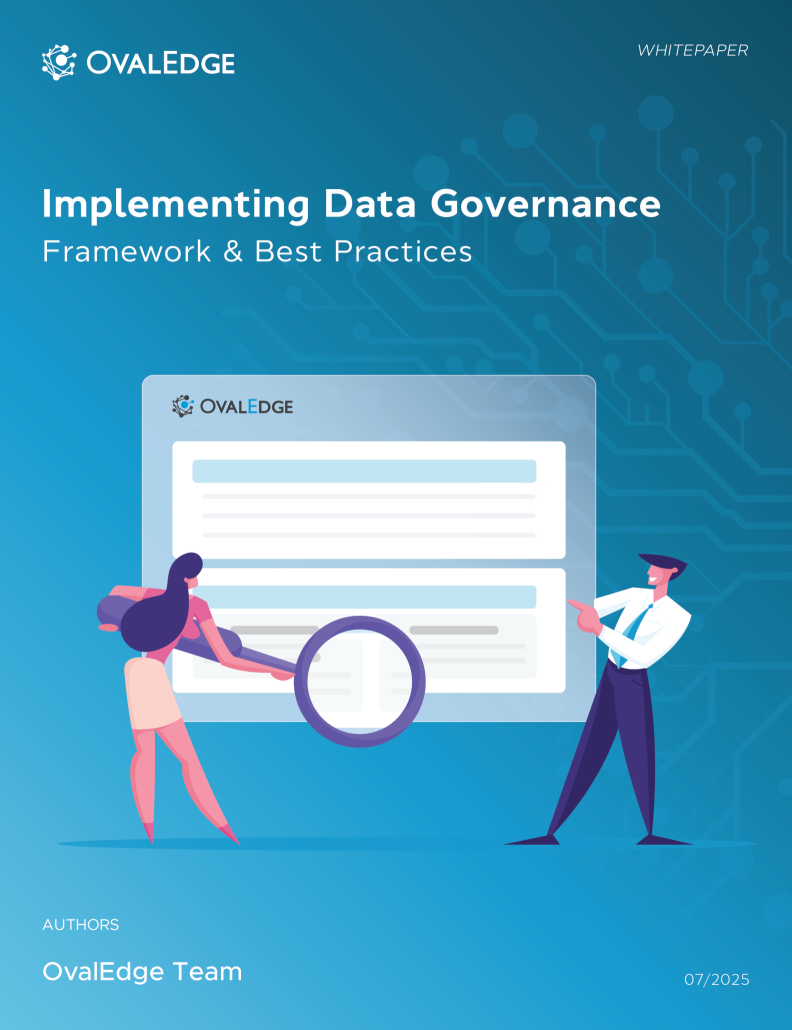Table of Contents
Data Catalog vs Data Dictionary - Differences & Use Cases
In the modern age, companies are responsible for a mind-bogglingly huge amount of data. If you imagine as much data as possible, it wouldn’t even come close to the amount of data companies actually have.
This is because there are lots of benefits and opportunities that come with storing this much data:
- Improved decision-making: The more data you have, the better-informed decisions you can make
- Increased efficiency: By storing the data you need in one place, you can reduce your costs and streamline your processes
- New business opportunities: By analyzing large amounts of data you can identify potential opportunities, such as new products or services
- Improved customer service: You can use data about customers to identify their preferences, and pro-actively solve their issues
- What is a data catalog?
- What is a data dictionary?
- What are the key differences between a data catalog and a data dictionary?
But as Dolly Parton said, “If you want the rainbow, you gotta put up with the rain”. The rain, in this case, is worrying about things like security, privacy, governance, and compliance.
The more data you have, the harder it is to ensure and manage these things.
This is why things like data catalogs and data dictionaries are so vital. Not only do they help you get the most value out of your data, but they also help you to mitigate the risks.
In this article, we will answer these questions:
By the end, you’ll have a clear understanding of the two different concepts, why they’re different, and how both can benefit you and your company.
Data catalog
A data catalog is a tool that brings all your data sources into one place, making them all easily accessible and searchable.
Think of your data sources as local restaurants—your product database is Luigi’s Pizza, your sales CRM is Szechuan Palace, a SaaS integration is Biryani Hut, and Google Drive is Tacos El Rey.
Your data catalog is UberEats (or your preferred takeout service), bringing all those restaurants together, and making them available in one place.
And just like Uber Eats doesn’t need the restaurants to be in one place, a data catalog doesn’t need to move your data sources. It’s just giving you a view of everything, which can be used to analyze and make decisions.
(Is this analogy making anyone else hungry?)
There are several stages involved in building a data catalog, although different tools will carry them out in different ways:
- Active metadata crawling
- Profiling the data
- Lineage building
- Data relationships
- Classification
No matter what tool you use, though, the end goal is always the same—make it as easy as possible for people across your company to access, analyze, and get value from your data.
This is because doing so will result in a variety of pretty important benefits.
Reusability is one of the most important benefits. With a data catalog, you can reuse your data, getting even more value out of it. For example, you could use the data from one app to build a new app, create reports, or forecast for the future.
Data quality is another huge benefit of having a data catalog. By creating a central repository, and implementing validation rules, it’s much easier to find and fix poor-quality data and maintain a higher level of data quality.
Related: Best Practices for Improving Data Quality
Business leaders have to make decisions every day, but those decisions can only be as good as the data they’re based on. A data catalog gives you all the data in one place AND helps you to maintain a higher quality.
Meaning you and everyone in your business have a much clearer view of this data, so decisions can be reliably data-driven. This could be the difference between a good and bad decision, which could have huge ramifications on the future of the business.
Data dictionary
A data dictionary is a document (or set of documents) that contains key information about your data. This includes definitions and characteristics of data within a database or data source.
It’s a centralized resource, giving everyone in the company clear instructions on how to get the most out of the data. And by clearly outlining this information, it also helps to ensure the data remains consistent, accurate, and complete.
Here are some examples of the kind of information documented in a data dictionary:
- Element names
- Definitions
- Attributes
- Relationships
- Data owner
- Data usage info
- Data source
- Glossary
We’ve already touched upon a few, but there are a number of benefits that might not be as obvious.
For a start, you’re making sure that your company’s data is accurate, consistent, and complete. This is almost impossible to achieve without a data dictionary. And it’s instrumental is maintaining high data quality.
A data dictionary also helps to create a standardized view of data across your organization, which will both reduce errors and increase efficiency.
Staying on the theme of standardization, your data dictionary will also establish clear standards and rules company-wide, which is a cornerstone of data governance.
Related: Building an Effective Data Governance Framework
Main differences between Data Catalog and Data Dictionary
It’s probably quite clear from the above summaries, but data dictionary and data catalog are two very different concepts..webp?width=622&height=327&name=Data%20Catalog%20vs%20Data%20Dictionary%20Infographic%20(1).webp)
While a data dictionary provides information and guidance that will have a positive impact on the data, a data catalog has a much wider-reaching impact.
Essentially, a data dictionary contributes to the effectiveness of the data catalog. It’s a cog in the bigger machine.
But a data catalog brings not just all the data together, but also puts it in the hands of everyone in the company. It’s a hugely important part of data governance, data quality, and much more.
Related: Building a Business Glossary - Why and How
Data Catalog vs Data Dictionary: Key Differences
|
Feature / Aspect |
Data Catalog |
Data Dictionary |
|
Definition |
A centralized platform that indexes, organizes, and manages metadata from all data sources to make data easily discoverable and usable. |
A reference document that defines and describes individual data elements, their attributes, and relationships within a database. |
|
Primary Purpose |
To help users discover, access, and understand data assets across the organization. |
To document and standardize definitions of data elements for accuracy and consistency. |
|
Scope |
Enterprise-wide, covers all data sources, systems, and assets. |
Database-level, focuses on specific datasets, tables, or fields. |
|
Users |
Data analysts, business users, data engineers, and data stewards looking for insights or governance. |
Database administrators, developers, and data modelers ensuring structural and semantic consistency. |
|
Key Components |
Metadata repository, data lineage, data profiling, data quality metrics, user collaboration, and search capabilities. |
Field names, definitions, data types, relationships, ownership, and validation rules. |
|
Data Governance Role |
Supports data discovery, access management, and governance policies across the enterprise. |
Ensures data standardization and consistency within databases or systems. |
|
Automation Level |
Highly automated,crawls and updates metadata dynamically across systems. |
Typically manual or semi-automated, requiring input from data teams. |
|
Business Impact |
Improves data discoverability, collaboration, and decision-making. |
Improves data accuracy, clarity, and compliance. |
|
Example Tools |
OvalEdge, Alation, Collibra, Informatica. |
Built-in database dictionaries (Oracle, SQL Server) or custom documentation tools. |
|
Analogy |
Like UberEats, showing all restaurants (data sources) in one place. |
Like a recipe book, defining ingredients (data elements) and instructions. |
Conclusion
Both data catalogs and data dictionaries play an important role in managing your company’s data. But they play very different roles.
A data dictionary gives you a system for documenting the structure of a database, understanding the meaning of data elements, and identifying relationships between data elements.
Whereas a data catalog changes the way your company interacts and uses data by making it easy to discover and understand data, assess and improve data quality, and share data company-wide.
Frequently Asked Questions (FAQs)
- What is the main difference between a data catalog and a data dictionary?
A data catalog is a comprehensive platform that helps users find, understand, and use data across the organization, while a data dictionary provides detailed technical definitions of data elements within a specific database. - Can a data catalog work without a data dictionary?
A data catalog can function without a data dictionary, but combining both provides optimal results,the dictionary ensures accurate definitions, while the catalog enhances discoverability and accessibility. - Who uses a data dictionary vs a data catalog?
Data dictionaries are mostly used by technical users such as database administrators and data architects, whereas data catalogs are designed for both technical and business users who need to find and analyze data easily. - How do data catalogs support data governance?
Data catalogs help implement governance by centralizing metadata, tracking data lineage, managing access controls, and maintaining transparency about how data is used across departments. - Why is a data dictionary important for data quality?
A data dictionary ensures all stakeholders use consistent definitions and formats, reducing ambiguity, duplication, and errors,critical for maintaining high data quality and integrity. - Should organizations use both a data catalog and a data dictionary?
Yes. The two complement each other, the data dictionary ensures accurate documentation, while the data catalog helps everyone discover, access, and apply that documented data effectively.
Want to see how to build a data dictionary and data catalog using OvalEdge? Schedule a customized demo with one of our experts.
What you should do now
|
OvalEdge recognized as a leader in data governance solutions
.png?width=1081&height=173&name=Forrester%201%20(1).png)
“Reference customers have repeatedly mentioned the great customer service they receive along with the support for their custom requirements, facilitating time to value. OvalEdge fits well with organizations prioritizing business user empowerment within their data governance strategy.”
.png?width=1081&height=241&name=KC%20-%20Logo%201%20(1).png)
“Reference customers have repeatedly mentioned the great customer service they receive along with the support for their custom requirements, facilitating time to value. OvalEdge fits well with organizations prioritizing business user empowerment within their data governance strategy.”
Gartner, Magic Quadrant for Data and Analytics Governance Platforms, January 2025
Gartner does not endorse any vendor, product or service depicted in its research publications, and does not advise technology users to select only those vendors with the highest ratings or other designation. Gartner research publications consist of the opinions of Gartner’s research organization and should not be construed as statements of fact. Gartner disclaims all warranties, expressed or implied, with respect to this research, including any warranties of merchantability or fitness for a particular purpose.
GARTNER and MAGIC QUADRANT are registered trademarks of Gartner, Inc. and/or its affiliates in the U.S. and internationally and are used herein with permission. All rights reserved.



.webp)


